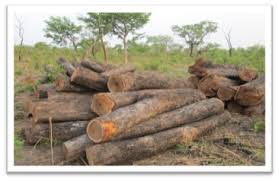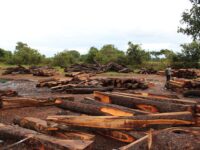Harvesting of Rosewood is still persistent in Northern Ghana despite a ban on the trade in January this year.
The hardest hit districts are North Gonja, West Gonja, Central Gonja, East Gonja and Bole Districts, all in the Northern Region as well as a few others in the Upper East and Upper West Regions.
The trade is as common as harvesting of firewood among districts in Gonja land.
China is the dominant importer of Ghana’s rosewood, contributing averagely 96 per cent of total imports, according to last year’s projections made by the Timber Industry Development Division (TIDD) of the Forestry Commission.
Mr. Daryl Bosu, an official of Arocha Ghana, a Non-Governmental Organisation (NGO), disclosed this during a presentation on the topic “Rosewood Harvesting in the North; Lessons and Consequences” at the Northern Zone Forest Forum held in Tamale.
Emerging issues, according to Mr. Bosu, were that designated development areas had been turned into massive logging ones in the savannah eco-zone of Ghana.
 He mentioned weak local governance system for the regulation of the harvesting and trade of natural products and the involvement of traditional authorities in condoning the trade as other challenges.
He mentioned weak local governance system for the regulation of the harvesting and trade of natural products and the involvement of traditional authorities in condoning the trade as other challenges.
Mr. Bosu also expressed concern that the multi-million dollar rosewood trade was being controlled by Timber Merchants and the Chinese, a situation that had left the rural poor communities as victims of market forces.
He said some of the consequences of the trade in those districts had undermined the social relevance of traditional leadership and had resulted in the breakdown of the rule of law.
The forum, which was organised by Civic Response in collaboration with Forest Watch Ghana, brought together about 80 participants including farmers, security agencies, institutions, civil society and the media.
Mr. Kingsley Bekoe Ansah, an official of Civic Response said the objective was to create a platform for different forest stakeholders to discuss and find solutions to challenges in the forest sector.
He said it was also to help build capacity of forest sector stakeholders to enable them to monitor forest programmes and policies as well as help improve forest governance in the country.
He said successes chalked out in terms of the forest forums so far included increase knowledge of forest communities with respect to the setting up of bye-laws to protect the forest and called on other stakeholders to support the course.



